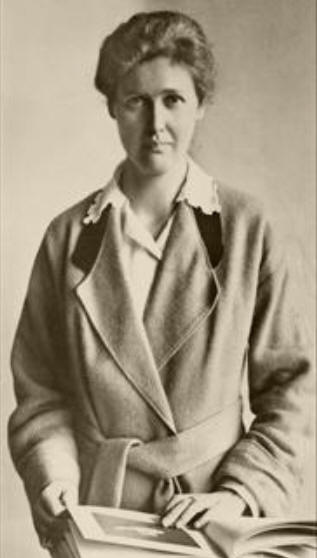

Queer Places:
2 Woodstock Rd, Oxford OX2 6HT, UK
9 Fyfield Rd, Oxford OX2 6QE, UK
64 Woodstock Rd, Oxford OX2 6HR, UK
University of Oxford, Oxford, Oxfordshire OX1 3PA
University of Birmingham, Edgbaston, Birmingham, West Midlands B15 2TT, UK
 Rose Sidgwick (January 9, 1877 - December 28, 1918) was a British
university teacher and one of the founders of the
International Federation of University Women. Seven women from Britain made
the ocean voyage to New York in the autumn of 1918 to visit 46 universities
and colleges over six weeks and produce proposals for productive British–US
exchanges. Unfortunately, two of them,
Caroline Spurgeon, the first
female university professor in Britain at Bedford College in London, and
Rose Sidgwick, an English
lecturer at Birmingham University, caught flu (this was during the 1918–19 flu
epidemic) on board ship. Sidgwick died, but Spurgeon survived, convalescing in
the home of New York college dean Virginia Gildersleeve,
with whom she formed an intimate personal and professional attachment for the
rest of her life.
Rose Sidgwick (January 9, 1877 - December 28, 1918) was a British
university teacher and one of the founders of the
International Federation of University Women. Seven women from Britain made
the ocean voyage to New York in the autumn of 1918 to visit 46 universities
and colleges over six weeks and produce proposals for productive British–US
exchanges. Unfortunately, two of them,
Caroline Spurgeon, the first
female university professor in Britain at Bedford College in London, and
Rose Sidgwick, an English
lecturer at Birmingham University, caught flu (this was during the 1918–19 flu
epidemic) on board ship. Sidgwick died, but Spurgeon survived, convalescing in
the home of New York college dean Virginia Gildersleeve,
with whom she formed an intimate personal and professional attachment for the
rest of her life.
Rose was born on January 9, 1877, in Rugby, Warwickshire, as the second daughter of Charlotte Sophia Wilson (1853–1924) and Arthur Sidgwick (1840–1920), assistant master at Rugby School. He later became classics tutor at Oxford and was a strong supporter of women’s higher education, teaching for the Association for Promoting the Higher Education of Women and acting as its Secretary from 1882-1907.
In 1895, Arthur made an important contribution to the establishment of teacher training in Oxford when, in evidence to the Royal Commission on Secondary Education (Bryce Commission), he ‘put forward the case that the business of the University was the training of the teacher as a whole…in the practice of teaching and in an apprenticeship to schools which would be in some relationship with the university’. Arthur’s sister-in-law, Eleanor Mildred Sidgwick, was one of the three female members of the Bryce Commission and sister of Arthur Balfour, Prime Minister from 1902-1905.
In 1881, when Rose was 4 years old, the young family was living at 2, Woodstock Road, later moving to 64 Woodstock Road where Rose was still living with her parents and siblings in 1891 and 1901 .
Rose attended Oxford Girls High School when it was located at 21 Banbury Road and then, on leaving, she registered with the Society of Oxford Home Students and won a first class honours degree in modern history. She lectured at the Oxford Pupil Teacher’s Centre and, in 1902, enrolled in the Diploma of Education and attended the course in the Trinity and Michaelmas Terms of 1902 and Hilary Term 1903. She passed the examination with Distinction in April 1903 and was awarded the diploma on 16 November of the same year.
She then went on to Somerville College as temporary tutor in history and also became involved in assisting the librarian, Margery Fry, in setting up the new library which was nearing completion. Margery left shortly afterwards to take up the position of warden in a women students’ residence in Birmingham and Rose took over as librarian at Somerville receiving, amongst others, a gift of 2000 books from the library of John Stuart Mill.
In 1905, Rose was appointed as Assistant Lecturer in History at the University of Birmingham and followed her friend, Margery Fry, supporting her to run the university’s women’s residence on Hagley Road.
Rose made a strong impression in progressive educational circles while in Birmingham. In 1912, she was a founder member of the Social Study Advisory Board and was engaged in helping to train social workers through instruction in the history and methods of local government. She was active in support of the Workers Educational Association and as a serving member of the Staffordshire Education Committee. In 1914, after helping to organise the relocation of the women’s residence to University House, Rose took a greater administrative role when Margery went to the Western Front to assist with the Quaker relief effort.
In 1918, Rose was one of two women (the other being Caroline Spurgeon) invited to join a delegation from British Universities on a three-month mission to the USA to develop closer cooperation between universities in both countries. During the same visit, she also discussed the founding of a world organisation for higher educated women, with among others Virginia Gildersleeve, Dean of Barnard College, resulting in the launch of International Federation of University Women. Unfortunately, she contracted pneumonia as a result of the influenza pandemic which occurred during that period. She died on 28 December 1918 in the Post Graduate Hospital, New York and her death was reported in the New York Times of 30 December.
The Rose Sidgwick Memorial Fellowship, established by the American Association of University Women (AAWU), still offers scholarships for British women to undertake post-graduates studies in the USA. The award is administered by the British Federation of Women Graduates (BFWG).
A memorial birdbath stands in the grounds of Birmingham Business School, formerly University House, in Edgbaston Park Road in memory of Rose’s contributions to the social welfare and education of women in the city.
My published books: